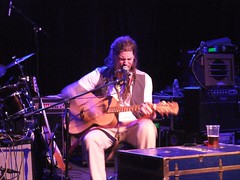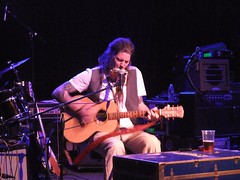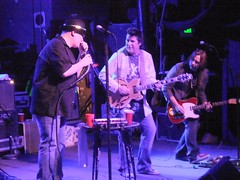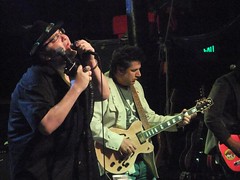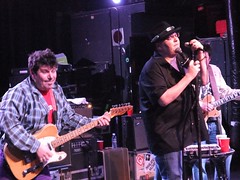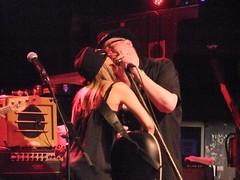What an odd collection of bands. There wasn't really a clear thread running through the acts. Denver openers Bad Weather California and Dovekins were like night and day: punk-minded garage rock and experimental indie folk. Similarly, while touring acts Delicate Steve and Akron/Family were both loud, their sound and stage presence were wildly divergent. Delicate Steve's songs were intricately constructed and somewhat introspective. Akron/Family's experimental noise-fest was more interactive.
The crowd was enthusiastic for all of the bands and the Marquis was a cozy venue with a good stage set up.
Bad Weather California
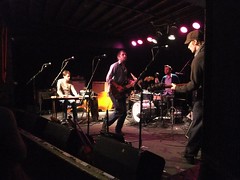 Bad Weather California opened with a shimmery indie groove. The heavily reverbed vocals added a strong retro vibe. That first song was an outlier; their other songs centered on a garage rock sound infused with a punk energy. The second song worked a Bo Diddley beat and the song devolved into an iconic basement jam feel. Psychedelic touches leaked in, especially with the wah wah slide sounds.
Bad Weather California opened with a shimmery indie groove. The heavily reverbed vocals added a strong retro vibe. That first song was an outlier; their other songs centered on a garage rock sound infused with a punk energy. The second song worked a Bo Diddley beat and the song devolved into an iconic basement jam feel. Psychedelic touches leaked in, especially with the wah wah slide sounds. The line up was interesting. Frontman Chris Adolf focused on rhythm guitar, but also looped some parts, while Adam Baumeister played a mix of slide on an old Sears Silvertone and some straight steel guitar. The slide and steel work gave the band a unique spin. The bass and drums laid a solid foundation for the Bad Weather California's songs.
The line up was interesting. Frontman Chris Adolf focused on rhythm guitar, but also looped some parts, while Adam Baumeister played a mix of slide on an old Sears Silvertone and some straight steel guitar. The slide and steel work gave the band a unique spin. The bass and drums laid a solid foundation for the Bad Weather California's songs. Adolf was adept at working the crowd, setting up call and response sections or eliciting crowd involvement. While the rest of the band lacked a strong stage presence, Adolf made up for it as he gyrated around, sometimes addressing the crowd directly and other times talking to his inner demons.
Adolf was adept at working the crowd, setting up call and response sections or eliciting crowd involvement. While the rest of the band lacked a strong stage presence, Adolf made up for it as he gyrated around, sometimes addressing the crowd directly and other times talking to his inner demons.Tight energetic arrangements, an interesting psycho-garage sound, and a good visual show made Bad Weather California a strong opening act.
Dovekins
 Dovekins proved to be the big surprise element for this show. In direct contrast to the volume, wail, and power of the other acts, Dovekins embraced an indie folk sound that meshed well with their sincere and joyous stage presence. They also had a touch of jam band, with interesting progressions and dynamics.
Dovekins proved to be the big surprise element for this show. In direct contrast to the volume, wail, and power of the other acts, Dovekins embraced an indie folk sound that meshed well with their sincere and joyous stage presence. They also had a touch of jam band, with interesting progressions and dynamics.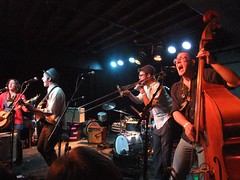 The first song stayed fairly grounded, begging the question of how they fit in this line up of bands. It became clear during the second song: the point of overlap proved to be their experimental approach with intricate and odd vocal arrangements. These vocal parts were consistently interesting, sometimes bizarre. They came from somewhere between modern choral treatments and vocal jazz stylings.
The first song stayed fairly grounded, begging the question of how they fit in this line up of bands. It became clear during the second song: the point of overlap proved to be their experimental approach with intricate and odd vocal arrangements. These vocal parts were consistently interesting, sometimes bizarre. They came from somewhere between modern choral treatments and vocal jazz stylings. Dovekins' music was free form, yet often seemed precisely arranged. The drop outs and instrumental handoffs flowed smoothly. Their flavor of indie folk was rooted in some of the trippier jazz influenced sounds of retro San Francisco bands like It's a Beautiful Day. Imagine the flowing jazz groove of White Bird, but layered with tightly coordinated vocalizations that slide between words and sound, chaos and harmony.
Dovekins' music was free form, yet often seemed precisely arranged. The drop outs and instrumental handoffs flowed smoothly. Their flavor of indie folk was rooted in some of the trippier jazz influenced sounds of retro San Francisco bands like It's a Beautiful Day. Imagine the flowing jazz groove of White Bird, but layered with tightly coordinated vocalizations that slide between words and sound, chaos and harmony. The five musicians brought enough instruments along to field another band: stand up bass, clarinet, flute, mandolin, accordion, trombone, guitar, banjo, and drums. This made for a constantly shifting sound from song to song. Along the way, each one seemed to have a clear driver. For example, Laura Goldhamer's banjo and lead vocals (complete with funny voices) drove No Ability.
The five musicians brought enough instruments along to field another band: stand up bass, clarinet, flute, mandolin, accordion, trombone, guitar, banjo, and drums. This made for a constantly shifting sound from song to song. Along the way, each one seemed to have a clear driver. For example, Laura Goldhamer's banjo and lead vocals (complete with funny voices) drove No Ability.I'll be keeping an ear out for Dovekins in the future, to see what other surprises they'll provide.
Delicate Steve
 I was looking forward to catching Delicate Steve after listening to his recent album, Wondervisions (review here). The album is experimental, with layers of guitar and solid percussion. It held the promise of a wilder live expression. The good news is that the band delivered a great set, with looser versions of the studio songs. The downside is that their set was absurdly short (only 20 minutes).
I was looking forward to catching Delicate Steve after listening to his recent album, Wondervisions (review here). The album is experimental, with layers of guitar and solid percussion. It held the promise of a wilder live expression. The good news is that the band delivered a great set, with looser versions of the studio songs. The downside is that their set was absurdly short (only 20 minutes). The set list included one of my favorite tracks, The Ballad of Speck and Pebble. The bouncy Paul Simon vibe was there, along with Steve Marion's distinctive guitar sound. The live version had a quicker tempo, but expanded on the guitar fills to draw it out longer.
The set list included one of my favorite tracks, The Ballad of Speck and Pebble. The bouncy Paul Simon vibe was there, along with Steve Marion's distinctive guitar sound. The live version had a quicker tempo, but expanded on the guitar fills to draw it out longer.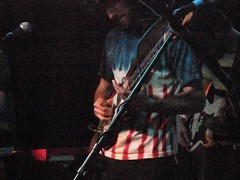 Despite being primarily an instrumental band, Marion engaged the audience and the band was fairly expressive. They still hit the dynamic shifts from the studio, but their live sound was scaled up immensely. Delicate Steve hit a perfect balance of controlled chaos. Despite the brevity, it was a highly energetic set.
Despite being primarily an instrumental band, Marion engaged the audience and the band was fairly expressive. They still hit the dynamic shifts from the studio, but their live sound was scaled up immensely. Delicate Steve hit a perfect balance of controlled chaos. Despite the brevity, it was a highly energetic set. The drums were especially driving, providing a jungle beat. It's rare to see a standing drummer, but his work on the kick drum didn't seem to suffer and he also had enough drum pads and other toys to expand his basic kit. The keys were heavily chorused to sound like Brian May's guitar playing with Queen. Steve Marion's guitar setup included a host of toys, but his primary effect was a whammy pedal. Marion's control let him wail or dive in pitch in one section, then sweep the pitch to make his guitar sound like Adrian Belew's synth guitar.
The drums were especially driving, providing a jungle beat. It's rare to see a standing drummer, but his work on the kick drum didn't seem to suffer and he also had enough drum pads and other toys to expand his basic kit. The keys were heavily chorused to sound like Brian May's guitar playing with Queen. Steve Marion's guitar setup included a host of toys, but his primary effect was a whammy pedal. Marion's control let him wail or dive in pitch in one section, then sweep the pitch to make his guitar sound like Adrian Belew's synth guitar. With the short set, Delicate Steve left about the time they were hitting their stride. The crowd would have appreciated more.
With the short set, Delicate Steve left about the time they were hitting their stride. The crowd would have appreciated more.Akron/Family
 What a schizophrenic set. Akron/Family would create a mood, only to sweep it away. The dynamics bounced from meditative soundscapes to cathartic rage, from ecstatic ritual to challenging post rock. The crowd was packed with fans, ready to take every change in stride. Personally, I'd have preferred a more consistent set. The constant flux seemed like a ploy to keep the audience off guard or a loss of creative vision.
What a schizophrenic set. Akron/Family would create a mood, only to sweep it away. The dynamics bounced from meditative soundscapes to cathartic rage, from ecstatic ritual to challenging post rock. The crowd was packed with fans, ready to take every change in stride. Personally, I'd have preferred a more consistent set. The constant flux seemed like a ploy to keep the audience off guard or a loss of creative vision. Akron/Family's strength was their skill at playing with sonic textures. The set opened with subtle currents of sound rising from the deeps. Dreamy swells of guitar set a loose, free form. This grew into a thick wall of sound, driven by a pounding beat. It was reminiscent of Bear in Heavens more intense material. The mood shifts in this first song were wide, but flowed fairly smoothly.
Akron/Family's strength was their skill at playing with sonic textures. The set opened with subtle currents of sound rising from the deeps. Dreamy swells of guitar set a loose, free form. This grew into a thick wall of sound, driven by a pounding beat. It was reminiscent of Bear in Heavens more intense material. The mood shifts in this first song were wide, but flowed fairly smoothly. Later, Akron/Family built ambient moments with faint bass rumble, feedback wails, and wordless vocalizations. This often collapsed into thick waves of indie rock distortion. The three musicians' palette also included a small collection of cheap keyboards, synth pads, and other electronic toys.
Later, Akron/Family built ambient moments with faint bass rumble, feedback wails, and wordless vocalizations. This often collapsed into thick waves of indie rock distortion. The three musicians' palette also included a small collection of cheap keyboards, synth pads, and other electronic toys. The darker side came out later in a piece that was set up as a guided meditation. After setting up the visualization of a beach and starting the audience swaying with the current, they slipped into a spacey jam. This suddenly dropped into jarring feedback layered with incoherent screams. Damn, they bulldozed my happy place. A trick like that is an interesting gimmick, but it gets old when it's used again and again. The irony is that this chaos turned out to be the start of So It Goes, their latest single. The recorded version is a more interesting track than their deconstruction.
The darker side came out later in a piece that was set up as a guided meditation. After setting up the visualization of a beach and starting the audience swaying with the current, they slipped into a spacey jam. This suddenly dropped into jarring feedback layered with incoherent screams. Damn, they bulldozed my happy place. A trick like that is an interesting gimmick, but it gets old when it's used again and again. The irony is that this chaos turned out to be the start of So It Goes, their latest single. The recorded version is a more interesting track than their deconstruction.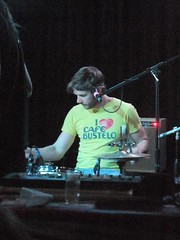 In between the noise experiments, we had 6 minute drum circle/chanting ritual (with a host of guest percussionists), some Freelance Whales style indie rock, some acid-soaked post rock, and some jam band indulgence. Many interesting ideas, but without much context. The drum and percussion work was tight throughout and the vocal harmonies were often impressive.
In between the noise experiments, we had 6 minute drum circle/chanting ritual (with a host of guest percussionists), some Freelance Whales style indie rock, some acid-soaked post rock, and some jam band indulgence. Many interesting ideas, but without much context. The drum and percussion work was tight throughout and the vocal harmonies were often impressive.If Akron/Family had embraced their noisier half, like Butthole Surfers, it would have been a great cathartic set. If they had toned down the noise, while keeping the stylistic mash up, it still might have worked. The jumble, though, lacked subtlety. The set was a step away from their recent album, Akron/Family II: The Cosmic Birth and Journey of Shinju TNT, relying more on shock than awe.
More photos on my Flickr.












